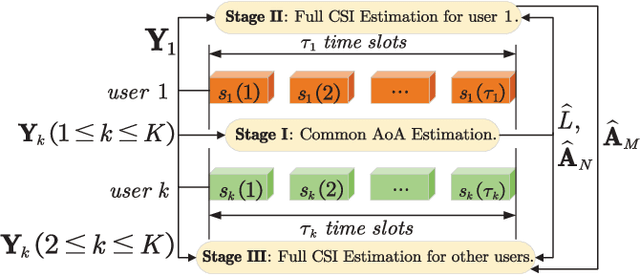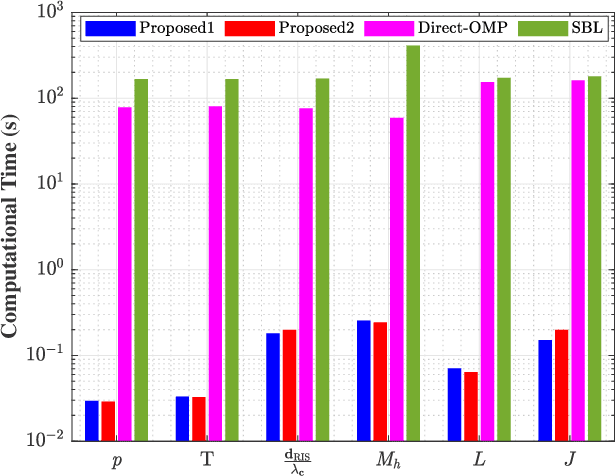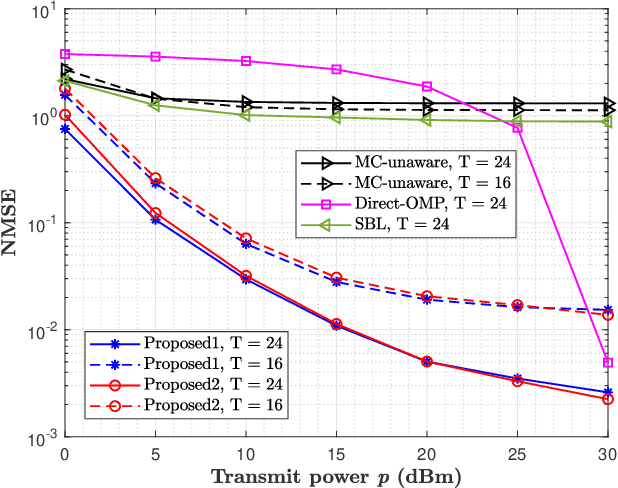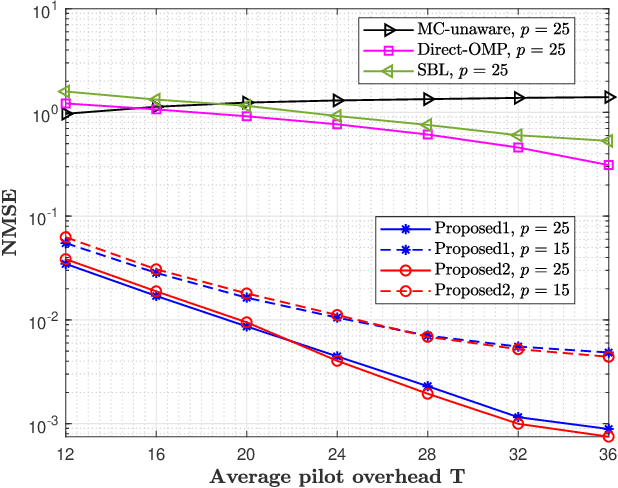Ruidong Li
Mutual Coupling Aware Channel Estimation for RIS-Aided Multi-User mmWave Systems
Nov 11, 2025



Abstract:This paper proposes a three-stage uplink channel estimation protocol for reconfigurable intelligent surface (RIS)-aided multi-user (MU) millimeter-wave (mmWave) multiple-input single-output (MISO) systems, where both the base station (BS) and the RIS are equipped with uniform planar arrays (UPAs). The proposed approach explicitly accounts for the mutual coupling (MC) effect, modeled via scattering parameter multiport network theory. In Stage~I, a dimension-reduced subspace-based method is proposed to estimate the common angle of arrival (AoA) at the BS using the received signals across all users. In Stage~II, MC-aware cascaded channel estimation is performed for a typical user. The equivalent measurement vectors for each cascaded path are extracted and the reference column is reconstructed using a compressed sensing (CS)-based approach. By leveraging the structure of the cascaded channel, the reference column is rearranged to estimate the AoA at the RIS, thereby reducing the computational complexity associated with estimating other columns. Additionally, the common angle of departure (AoD) at the RIS is also obtained in this stage, which significantly reduces the pilot overhead for estimating the cascaded channels of other users in Stage~III. The RIS phase shift training matrix is designed to optimize performance in the presence of MC and outperforms random phase scheme. Simulation results validate that the proposed method yields better performance than the MC-unaware and existing approaches in terms of estimation accuracy and pilot efficiency.
Task-Oriented Semantic Communication in Large Multimodal Models-based Vehicle Networks
May 05, 2025



Abstract:Task-oriented semantic communication has emerged as a fundamental approach for enhancing performance in various communication scenarios. While recent advances in Generative Artificial Intelligence (GenAI), such as Large Language Models (LLMs), have been applied to semantic communication designs, the potential of Large Multimodal Models (LMMs) remains largely unexplored. In this paper, we investigate an LMM-based vehicle AI assistant using a Large Language and Vision Assistant (LLaVA) and propose a task-oriented semantic communication framework to facilitate efficient interaction between users and cloud servers. To reduce computational demands and shorten response time, we optimize LLaVA's image slicing to selectively focus on areas of utmost interest to users. Additionally, we assess the importance of image patches by combining objective and subjective user attention, adjusting energy usage for transmitting semantic information. This strategy optimizes resource utilization, ensuring precise transmission of critical information. We construct a Visual Question Answering (VQA) dataset for traffic scenarios to evaluate effectiveness. Experimental results show that our semantic communication framework significantly increases accuracy in answering questions under the same channel conditions, performing particularly well in environments with poor Signal-to-Noise Ratios (SNR). Accuracy can be improved by 13.4% at an SNR of 12dB and 33.1% at 10dB, respectively.
Modular XL-Array-Enabled 3-D Localization based on Hybrid Spherical-Planar Wave Model in Terahertz Systems
Apr 18, 2025Abstract:This work considers the three-dimensional (3-D) positioning problem in a Terahertz (THz) system enabled by a modular extra-large (XL) array with sub-connected architecture. Our purpose is to estimate the Cartesian Coordinates of multiple user equipments (UEs) with the received signal of the RF chains while considering the spatial non-stationarity (SNS). We apply the hybrid spherical-planar wave model (HSPWM) as the channel model owing to the structual feature of the modular array, and propose a 3-D localization algorithm with relatively high accuracy and low complexity. Specifically, we first distinguish the visible sub-arrays (SAs) located in the VR and estimate the angles-of-arrival (AoAs) from each UE to typical visible SAs with the largest receive power via compressed sensing (CS) method. In addition, we apply the weighted least square (WLS) method to obtain a coarse 3-D position estimation of each UE according to the AoA estimations. Then, we estimate the AoAs of the other SAs with a reduced dictionary (RD)-CS-based method for lower computational complexity, and utilize all the efficient AoA estimations to derive a fine position estimation. Simulation results indicate that the proposed positioning framework based on modular XL-array can achieve satisfactory accuracy with evident reduction in complexity. Furthermore, the deployment of SAs and the allocation of antenna elements need to be specially designed for better positioning performance.
DP-LET: An Efficient Spatio-Temporal Network Traffic Prediction Framework
Apr 04, 2025Abstract:Accurately predicting spatio-temporal network traffic is essential for dynamically managing computing resources in modern communication systems and minimizing energy consumption. Although spatio-temporal traffic prediction has received extensive research attention, further improvements in prediction accuracy and computational efficiency remain necessary. In particular, existing decomposition-based methods or hybrid architectures often incur heavy overhead when capturing local and global feature correlations, necessitating novel approaches that optimize accuracy and complexity. In this paper, we propose an efficient spatio-temporal network traffic prediction framework, DP-LET, which consists of a data processing module, a local feature enhancement module, and a Transformer-based prediction module. The data processing module is designed for high-efficiency denoising of network data and spatial decoupling. In contrast, the local feature enhancement module leverages multiple Temporal Convolutional Networks (TCNs) to capture fine-grained local features. Meanwhile, the prediction module utilizes a Transformer encoder to model long-term dependencies and assess feature relevance. A case study on real-world cellular traffic prediction demonstrates the practicality of DP-LET, which maintains low computational complexity while achieving state-of-the-art performance, significantly reducing MSE by 31.8% and MAE by 23.1% compared to baseline models.
FDLLM: A Text Fingerprint Detection Method for LLMs in Multi-Language, Multi-Domain Black-Box Environments
Jan 27, 2025



Abstract:Using large language models (LLMs) integration platforms without transparency about which LLM is being invoked can lead to potential security risks. Specifically, attackers may exploit this black-box scenario to deploy malicious models and embed viruses in the code provided to users. In this context, it is increasingly urgent for users to clearly identify the LLM they are interacting with, in order to avoid unknowingly becoming victims of malicious models. However, existing studies primarily focus on mixed classification of human and machine-generated text, with limited attention to classifying texts generated solely by different models. Current research also faces dual bottlenecks: poor quality of LLM-generated text (LLMGT) datasets and limited coverage of detectable LLMs, resulting in poor detection performance for various LLMGT in black-box scenarios. We propose the first LLMGT fingerprint detection model, \textbf{FDLLM}, based on Qwen2.5-7B and fine-tuned using LoRA to address these challenges. FDLLM can more efficiently handle detection tasks across multilingual and multi-domain scenarios. Furthermore, we constructed a dataset named \textbf{FD-Datasets}, consisting of 90,000 samples that span multiple languages and domains, covering 20 different LLMs. Experimental results demonstrate that FDLLM achieves a macro F1 score 16.7\% higher than the best baseline method, LM-D.
Social-Aware Clustered Federated Learning with Customized Privacy Preservation
Dec 25, 2022Abstract:A key feature of federated learning (FL) is to preserve the data privacy of end users. However, there still exist potential privacy leakage in exchanging gradients under FL. As a result, recent research often explores the differential privacy (DP) approaches to add noises to the computing results to address privacy concerns with low overheads, which however degrade the model performance. In this paper, we strike the balance of data privacy and efficiency by utilizing the pervasive social connections between users. Specifically, we propose SCFL, a novel Social-aware Clustered Federated Learning scheme, where mutually trusted individuals can freely form a social cluster and aggregate their raw model updates (e.g., gradients) inside each cluster before uploading to the cloud for global aggregation. By mixing model updates in a social group, adversaries can only eavesdrop the social-layer combined results, but not the privacy of individuals. We unfold the design of SCFL in three steps. \emph{i) Stable social cluster formation. Considering users' heterogeneous training samples and data distributions, we formulate the optimal social cluster formation problem as a federation game and devise a fair revenue allocation mechanism to resist free-riders. ii) Differentiated trust-privacy mapping}. For the clusters with low mutual trust, we design a customizable privacy preservation mechanism to adaptively sanitize participants' model updates depending on social trust degrees. iii) Distributed convergence}. A distributed two-sided matching algorithm is devised to attain an optimized disjoint partition with Nash-stable convergence. Experiments on Facebook network and MNIST/CIFAR-10 datasets validate that our SCFL can effectively enhance learning utility, improve user payoff, and enforce customizable privacy protection.
Mobile Wireless Rechargeable UAV Networks: Challenges and Solutions
Mar 24, 2022



Abstract:Unmanned aerial vehicles (UAVs) can help facilitate cost-effective and flexible service provisioning in future smart cities. Nevertheless, UAV applications generally suffer severe flight time limitations due to constrained onboard battery capacity, causing a necessity of frequent battery recharging or replacement when performing persistent missions. Utilizing wireless mobile chargers, such as vehicles with wireless charging equipment for on-demand self-recharging has been envisioned as a promising solution to address this issue. In this article, we present a comprehensive study of \underline{v}ehicle-assisted \underline{w}ireless rechargeable \underline{U}AV \underline{n}etworks (VWUNs) to promote on-demand, secure, and efficient UAV recharging services. Specifically, we first discuss the opportunities and challenges of deploying VWUNs and review state-of-the-art solutions in this field. We then propose a secure and privacy-preserving VWUN framework for UAVs and ground vehicles based on differential privacy (DP). Within this framework, an online double auction mechanism is developed for optimal charging scheduling, and a two-phase DP algorithm is devised to preserve the sensitive bidding and energy trading information of participants. Experimental results demonstrate that the proposed framework can effectively enhance charging efficiency and security. Finally, we outline promising directions for future research in this emerging field.
* Accepted by IEEE Communication Magazine
 Add to Chrome
Add to Chrome Add to Firefox
Add to Firefox Add to Edge
Add to Edge